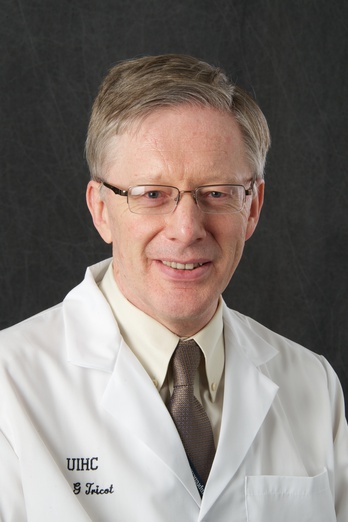Journal of Leukemia
Open Access
ISSN: 2329-6917
ISSN: 2329-6917

Guido J.K. Tricot
Professor of Medicine
University of Iowa Hospitals and Clinics, Iowa City, Iowa, USA
Dr. Guido J.K. Tricot is a Professor of Medicine, University of Iowa Hospitals and Clinics. Dr. Tricot has served as Professor of Medicine, University of Utah School of Medicine in the previously. He received his M.D. degree from the University of Leuven, Belgium in 1975. His major research interest remains Multiple Myeloma. Dr. Tricot is also the Director of the Adult Stem Cell and Myeloma Program at the University of Iowa and has served as Director of the Bone Marrow Transplant and Myeloma Program at the University of Utah, Director of Clinical Research, Myeloma Institute for Research and Therapy, Director, Myeloma and Transplantation Research Center, Arkansas Cancer Research Center, University of Arkansas for Medical Sciences, Little Rock, AR. He is associated with renowned societies like International Society of Hematology, Dutch Society of Hematology, and Central Society for Clinical Research and American Society for Blood and Marrow Transplantation. He has been honored with Professor Aggrege at University of Leuven in 1985. He is Editorial board member for journals of Bone Marrow Research, Journal of Blood and Lymph, Journal of Cancer Therapy. He is also a Principal Investigator for NIH.
Dr. Tricot's most recent clinical studies focus on not only attacking myeloma cells but also the microenvironment that supports the survival and growth of myeloma cells. His work aims at finding treatments that are non-cross-resistant with current chemotherapy and therefore can eradicate the drug-resistant myeloma cells. His work on detailed genetics of myeloma cells should allow individualized therapies to ensure the greatest efficacy, while minimizing toxicity. Over the last 15 years, the median survival for patients newly diagnosed with myeloma has, in large part due to this work, increased from 2.5 to more than 10 years. The complete remission rate has increased from 5% to 80% and one third of all patients are still in complete remission at 10 years.